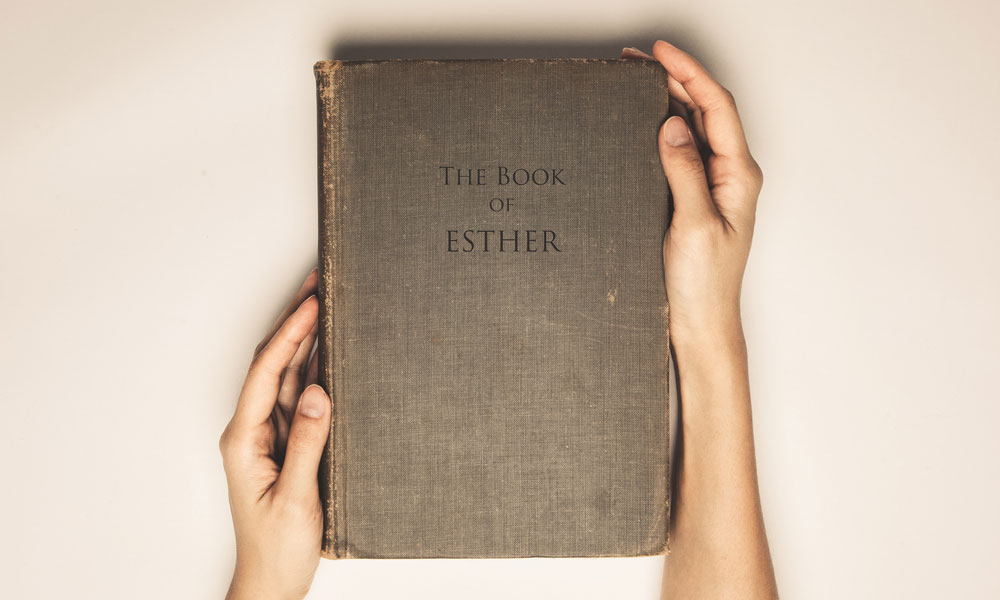(Esther - Part 1 | Part 2)
Only two books in the Bible – Esther and Ruth – are named for women. These inspiring books tell the stories of two young women whose lives played an important role in Israel’s history. In this study, we will look at the book of Esther.
Since Aglow’s inception, it has received many prophecies declaring that this Christian women’s organization has been raised up “for such a time as this.” Those familiar with Scripture will recognize this phrase from the book of Esther. Because of these prophecies and present world conditions; we believe we would do well to study Esther at this time.
First, we need to look at the background of this book. Esther takes place in Susa, Persia's (Iran's) capital city. The Persian Empire comprised more than half the known world at that time, and it is believed that between two and three million Jews lived there. Susa, the winter capital of the Persian kings, is the same city where Daniel received his vision earlier.
Esther's Hebrew name was “Hadassah”, which means myrtle. The events of the book take place during a period of ten years and time-wise they occur between chapters 6 and 7 of the book of Ezra. Esther is the fascinating account of how God saved His “chosen people” from annihilation in the Persian Empire. Although God’s name is not mentioned in the Book of Esther, He is both the author and director of all the events. Standing on the sidelines, we can imagine Him prompting, “Why do you think I introduced this character here?” “How am I going to get this character out of this situation?” “What do you think is going to happen next?”
Because we have had to condense much scripture in this study, we recommend that you read the book in its entirety if possible.
The Scripture: Esther 1:1-3
“This is what happened during the time of Xerxes, the Xerxes who ruled over 127 provinces stretching from India to Cush. At that time King Xerxes reigned from his royal throne in the citadel of Susa, and in the third year of his reign he gave a banquet for all his nobles and officials. The military leaders of Persia and Media, the princes, and the nobles of the provinces were present.”
1. What was the king doing at the beginning of the book?
It is believed that this banquet was a planned session for Persia’s campaign against Greece.
The Scripture: Esther 1:4
“For a full 180 days he (Xerxes) displayed the vast wealth of his kingdom and the splendor and glory of his majesty. When these days were over, the king gave a banquet, lasting seven days.”
2. How long did the first banquet last?
3. What followed this banquet?
Scripture goes on to describe the lavishness of Xerxes’ palace and the banquet, which quickly descended into a drunken orgy.
The Scripture: Esther 1: 10-12
“On the seventh day, when King Xerxes was in high spirits from wine, he commanded the seven eunuchs… to bring before him Queen Vashti, wearing her royal crown, in order to display her beauty to the people and nobles, for she was lovely to look at… But… Queen Vashti refused to come. Then the king became furious and burned with anger.”
4. What happened on the seventh day of the banquet?
5. Why?
6. What was Vashti’s response?
7. What was the king’s response?
Most authorities believe that modesty compelled Vashti to refuse the king’s command to appear before his drunken guests. Her refusal humiliated the king who consulted his advisors as to what to do with the queen.
The Scripture: Esther 1:19
Their decision: “Let the king issue a royal decree that Vashti is never again to enter the presence of King Xerxes.
8. What was their decision?
The Scripture: Esther 1:20
“When the king’s edict is proclaimed throughout all his vast realm, all the women will respect their husbands, from the least to the greatest.”
9. What did they believe the edict would accomplish?
The Scripture: Esther 2:2-3
“The king’s personal attendants proposed, “Let a search be made for beautiful young virgins for the king…Bring these beautiful girls into the harem of …Susa and let beauty treatments be given to them.”
10. What did the king’s attendants propose?
The Scripture: Esther 2:4
“Let the girl who pleases the king be queen instead of Vashti.”
11. What would happen to the girl who pleased the king?
The scene now changes to the home of Mordecai, a Jew who had been brought into exile and had raised his cousin, Hadassah (Esther) as his own daughter.
The Scripture: Esther 2:7b
“This girl…was lovely in form and feature.”
12. How is Esther described?
Esther was one of the women chosen and she was placed in the harem. There, she won the favor of Hegai, who was in charge of the harem, and he gave her special attention. He assigned her and her servants into the best place in the harem.
The Scripture: Esther 2:10
“Esther had not revealed her nationality and family background because Mordecai had forbidden her to do so.”
13. Why had Esther not revealed her nationality and family background?
Every day Mordecai walked near the courtyard of the harem to learn what was happening to Esther. After twelve months of beauty treatments, each woman went before the king. She would not return to him unless he summoned her.
The Scripture: Esther 2:17
“Now the king was attracted to Esther more than to any of the other women, and she won favor and approval more than any other virgin. So he set a royal crown on her head and made her queen.”
14. How did the king feel toward Esther?
15. What did he do?
The Scripture: Esther 2:18
“The king gave a banquet…for all his nobles and officials. He proclaimed a holiday throughout the provinces and distributed gifts with royal liberality.”
16. What else did he do?
In the days that followed, Mordecai overheard a plot to kill the king. He reported the plot to Esther, who in turn reported it to the king, giving credit to Mordecai. The plotters were executed and news of the event was recorded in the book of annals of the king.
Now we are introduced to the villain of the story.
The Scripture: Esther 3:1-2
“King Xerxes honored Haman, son of Hammedatha,…elevating him and giving him a seat of honor higher than that of all the other nobles. All the royal officials at the king’s gate kneeled down and paid honor to Haman, for the king had commanded this concerning him. But Mordecai would not kneel down or pay him honor.”
17. How did the king honor Haman?
18. Who refused to obey this command?
Although the Bible does not give us Mordecai’s reason for refusing, it was undoubtedly because doing so honored him as a god. Haman was furious. By now he had learned that Mordecai was a Jew and he looked for a way to destroy not only Mordecai but Mordecai’s people throughout the entire kingdom as well. By casting the pur (the lot) a special day and month for this deed were selected. He then told the king that the Jews were disobedient and should not be tolerated.
The Scripture: Esther 3:9
“If it pleases the king, let a decree be issued to destroy them.”
19. What was his suggestion?
King Xerxes agreed, and the order to destroy all the Jews and confiscate their goods went out throughout the entire kingdom.
The Scripture: Esther 3:15b
“The city of Susa was perplexed.” The Amplified Bible adds, “at the strange and alarming desire.”)
20. How did the people of Susa receive the edictt?
In part 2 of this study we will learn of the steps the infamous Haman took to ensure the success of his plan and what Mordecai and Esther were called to do to thwart his plans and ensure the safety of the Jews.
(Esther - Part 1 | Part 2)
The Answers
- Throwing a lavish banquet for all his nobles and officials
- 180 days
- A second banquet lasting 7 days
- The king commanded Queen Vashti to come before his guests, wearing her royal crown.
- Because she was lovely to look .at
- She refused.
- He was furious.
- That the king depose Vashti
- Cause all the women in the realm to respect their husbands
- That a search be made for beautiful women and that they be placed in the king's harem and given beauty treatments
- She would be made queen instead of Vashti
- As lovely in form and features
- Because Mordecai had forbidden her to do so
- He was more attracted to her than any of the others.
- He made her his queen.
- He gave a great banquet and proclaimed a holiday throughout the provinces and distributed gifts liberally.
- By elevating him above all the other nobles and commanding that everyone kneel down and pay him honor.
- Mordecai
- That a decree be issued to destroy them
- They were perplexed. The Amplified Bible adds "at the strange and alarming desire."
All scripture quotations in this publication are from The Holy Bible, New international Version
© Copyright 1973, 1978, 1984 New International Bible Society
© Copyright 2007 by JoAnne Sekowsky





